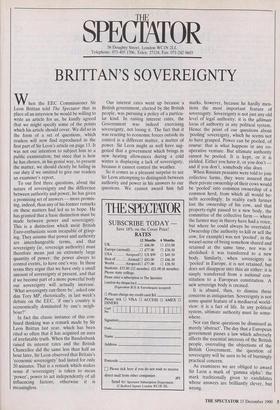SPECT Tm AT OR
56 Doughty Street, London WC1N 2LL Telephone: 071-405 1706; Telex: 27124; Fax: 071-242 0603
BRITTAN'S SOVEREIGNTY
To our first three questions, about the nature of sovereignty and the difference between authority and power, he has given a promising set of answers — more promis- ing, indeed, than any of his former remarks on these matters had led us to hope. He has granted that a basic distinction must be made between power and sovereignty. This is a distinction which most British Euro-enthusiasts seem incapable of grasp- ing. They assume that power and authority are interchangeable terms, and that sovereignty (ie, sovereign authority) must therefore mean just an extremely large quantity of power: the power always to control events, to have one's way. In these terms they argue that we have only a small amount of sovereignty at present, and that if we become part of a more powerful body our sovereignty will actually increase. 'What sovereignty can there be', asked one dim Tory MP, rhetorically, in last week's debate on the EEC, 'if one's country is economically dominated by one's neigh- bour?'
In fact the classic instance of this con- fused thinking was a remark made by Sir Leon Brittan last year, which has been cited so often that it has acquired an aura of irrefutable truth. When the Bundesbank raised its interest rates and the British Chancellor did the same less than half an hour later, Sir Leon observed that Britain's 'economic sovereignty' had lasted for only 20 minutes. That is a remark which makes sense if 'sovereignty' is taken to mean 'power', power to act independently of all influencing factors; otherwise it is meaningless. Our interest rates went up because a British government, elected by the British people, was pursuing a policy of a particu- lar kind. In raising interest rates, the Government was indeed exercising sovereignty, not losing it. The fact that it was reacting to economic forces outside its control is a different matter, a matter of power. Sir Leon might as well have sug- gested that a government which brings in new heating allowances during a cold winter is displaying a lack of sovereignty, because it cannot control the weather.
So it comes as a pleasant surprise to see Sir Leon attempting to distinguish between authority and power in his answers to our questions. We cannot award him full
marks, however, because he hardly men- tions the most important feature of sovereignty. Sovereignty is not just any old level of legal authority: it is the ultimate locus of authority in any political system. Hence the point of our questions about 'pooling' sovereignty, which he seems not to have grasped. Power can be pooled, of course: that is what happens in any co- operative venture. But ultimate authority cannot be pooled. It is kept, or it is yielded. Either you have it, or you don't — and if you don't, somebody else does.
When Russian peasants were told to join , collective farms, they were assured that their private ownership of their cows would be 'pooled' into common ownership of a common herd, from which all would be- nefit accordingly. In reality each farmer lost the ownership of his cow, and that property-right passed to a new body, the committee of the collective farm — where the farmer may in theory have had a voice, but where he could always be overruled. Ownership (the authority to kill or sell the cow, for example) was not 'pooled', in the weasel-sense of being somehow shared and retained at the same time, nor was it abolished: it was transferred to a new body. Similarly, when sovereignty is 'pooled' in Europe, it is not retained, but does not disappear into thin air either: it is simply transferred from a national con- stitution to a European constitution. A new sovereign body is created.
It is absurd, then, to dismiss these concerns as antiquarian. Sovereignty is not some quaint feature of a mediaeval world- view: it is a fact of life. In any political system, ultimate authority must lie some-
where. • Nor can these questions be dismissed as merely 'abstract'. The day that a European government passes a law which adversely affects the essential interests of the British people, overruling the objections of the British Government, the question of sovereignty will be seen to be of burningly practical concern.
As examiners we are obliged to award Sir Leon a mark of 'gamma alpha': the mark traditionally given to candidates whose answers are brilliantly clever, but wrong.


























































 Previous page
Previous page